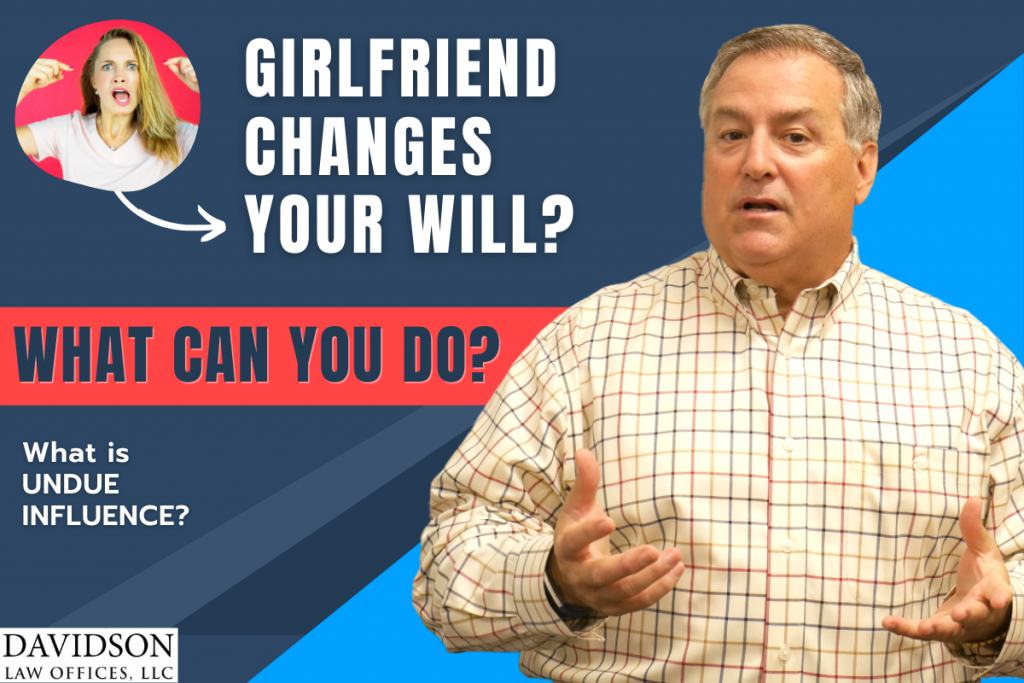What is “undue influence?” This is a term frequently heard in the estate planning realm, but it’s not a common term that you hear everyday. Even if you’ve never heard of undue influence, you’ve probably seen it happen or heard of it happening to someone you know.
We most frequently hear the term undue influence with regards to elder abuse and issues that arise when a will is contested. When their parents or grandparents pass, the children or grandchildren may contest the contents of the will. They’ll claim that their parents or grandparents were unduly influenced to change their will.
Undue influence can also occur when someone is still alive and is given a major gift. That major gift could be land, a house, assets, etc. In this case, an heir might argue that their parents or grandparents was unduly influenced by a friend or caregiver to the extent that they convinced that person to give them something that they otherwise wouldn’t have received.
Undue influence can arise within the context of a family member, a friend, or a non-related caregiver. It usually happens when you have an older person that is housebound. Because they’re not able to handle many of the activities of daily living, that older person has a caregiver that comes to assist them on a daily basis.
The caregiver begins to befriend the older person over time as the older person starts to rely on the caregiver for everything they need. They also start to rely on the caregiver for advice. Instead of having just a professional relationship as a caregiver, the relationship becomes closer than it should be. This is dangerous and often times leads to undue influence.
My Undue Influence Trial
The one and only jury trial I’ve ever had was regarding undue influence. This case happened about 10-15 years ago and it involved a will dispute. A guy had been living with his girlfriend for about 10 years when he suddenly was diagnosed with cancer. After the diagnosis, they got married quickly on short notice. Before the marriage, the guy had an attorney draft a will for him.
When that guy unfortunately died from cancer, his son was surprised to see what was in the will that was drafted. The son filed a caveat or protest of the will saying that his dad was unduly influenced by his now stepmother. The opposing attorney, representing the son, argued that this was a classic case of caregiver abuse.
He said that since the girlfriend was his caretaker for 10 years, she had weaseled her way into his personal finances and convinced him to do something that he otherwise wouldn’t have done. The contested asset here was the house. The son was arguing that the girlfriend shouldn’t have been given the house under the new will that was drafted, and that his father was unduly influenced to give her the house. All the other property was passed to the children.
I argued to the judge and jury that there was no evidence of undue influence here. I got a laugh the courtroom when I mentioned that I don’t know of any wife that doesn’t unduly influence her husband at some point to do something he doesn’t really want to do. At the conclusion of the trial, it was determined that there was no way to prove that father was unduly influenced. There was no way to prove that he wouldn’t have given her the house anyways since they had lived together for 10 years.
In order to prove undue influence, you have to show that the decision maker — in this case the husband that died of cancer — was persuaded by the wife (stepmom) to make certain decisions regarding property and that somehow he was coerced to do so. So that attorney was not successful. We argued the case in probate court, but it eventually went to the Superior Court and finally to the Georgia Court of Appeals.
As you can probably tell, undue influence is a tricky concept to prove in a court of law. The best measure is to prevent it from happening in the first place by making sure your loved ones aren’t influenced by caretakers and others. How do you do that? Communication is key here. Visit early and often.
If your loved one has a caretaker, make sure that caretaker doesn’t have access to mom or dad’s checkbook or other financial documents. We don’t want mom or dad coerced into doing something that they otherwise wouldn’t have done for that caretaker, friend, or family member. Make sure that the appropriate boundaries are preserved so that professional relationships don’t become more than just that.
Contact Us So We Can Help
If you have any questions regarding undue influence, don’t hesitate to give us a call at (229) 226-8183, email us at [email protected]. You can also COMPLETE THIS FORM and we’ll contact you to schedule an appointment. If you’d like to see this blog in video format, you can watch it below. Please be sure to SUBSCRIBE to our YouTube channel and click the bell notification button so that you’re notified each time we publish a new video.

